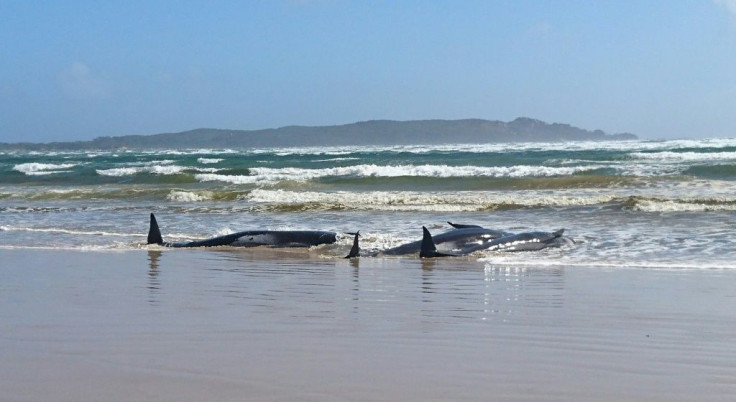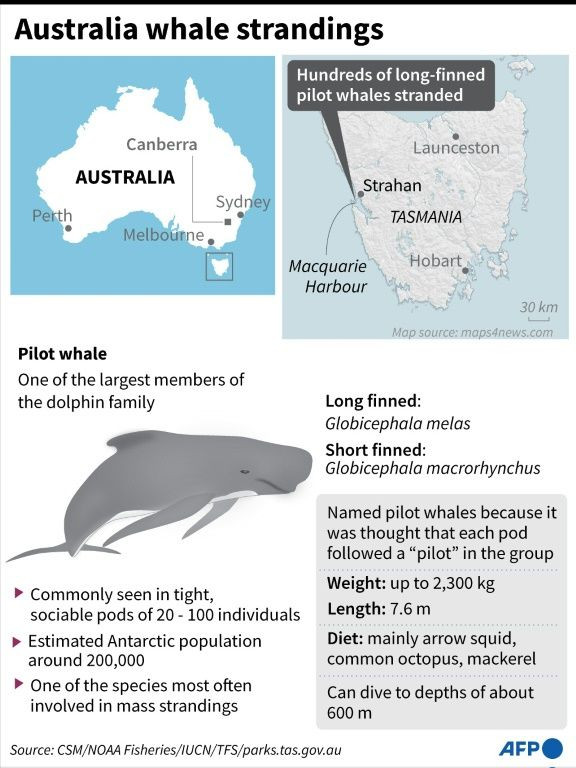Hundreds Of Whales Dead In Australia Stranding
Hundreds of pilot whales have died in a mass stranding in southern Australia despite efforts to save them, with rescuers racing Wednesday to free a few dozen survivors.
Another 200 long-finned pilot whales were discovered Wednesday in Macquarie Harbour, on the rugged and sparsely populated west coast of Tasmania, taking to 470 the number that have become stuck this week.
About 270 pilot whales were found Monday, sparking a major effort to free the giant mammals from a sandbar only accessible by boat.
Parks and Wildlife Service manager Nic Deka said most of the second pod, which was discovered early Wednesday morning by an aerial surveillance crew, were believed to be dead.
"We have a boat that's arrived on site a short while ago, so they've assessed one group -- the smaller group which is in one bay -- and all of those whales are dead," he told AFP.

"They're currently going around to the second bay where the bigger group is."
The rescue crew of 60 conservationists, skilled volunteers and local fish farm workers are now concentrating their efforts on the survivors from the first pod, which are partially submerged.
"The best assessment that we've got from this morning is that somewhere between 50 and 70 whales are potentially still alive," Deka said.
"So they're the animals that we're focusing our efforts on."
Rescuers spent Tuesday wading in the cold shallows to free about 25 creatures, using boats fitted with special slings to guide them back to the open ocean.
"They're focused on the job -- it's demanding work, some of them are up to their chest in cold water so we're trying to rotate the crews," Deka said.

"Its very draining physically. It's also draining emotionally."
The discovery of another 200 whales makes the mass stranding the largest recorded in Tasmania, an island state off mainland Australia's south coast.
They were found between seven and 10 kilometres (four-six miles) from the first group, with the distance and tannin-stained waters meaning rescuers did not spot them sooner.
Officials have now expanded their search area to see if more whales are stuck nearby.
Some of the whales rescued Tuesday re-stranded overnight in line with predictions by whale behaviour experts, but Deka remained upbeat about the rescue mission as several more were freed Wednesday.
"The good news is the majority of whales that were rescued are still out in deep water and swimming," he told reporters in the nearby town of Strahan.
"They haven't stranded. So we've been more successful than not."
The causes of mass strandings remain unknown -- even to scientists who have been studying the phenomenon for decades.
However, some researchers have suggested the highly sociable pilot whales may have gone off track after feeding close to the shoreline or by following one or two whales that strayed.
Tasmanian environment department marine biologist Kris Carlyon said it was a "natural event" with strandings of the species occurring regularly throughout history in both southern Australian and neighbouring New Zealand.
"We do step in and respond in these situations, but as far as being able to prevent these occurring in the future, there's really little that we can do," he said.
Carlyon said animal welfare issues were a major reason authorities and conservationists intervened in mass strandings, along with public expectations and the ability to learn more about a species.
© Copyright AFP 2024. All rights reserved.





















